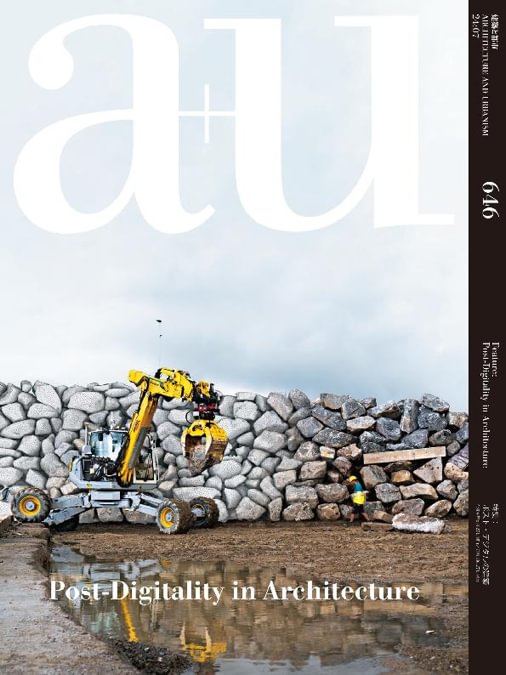凛凛堂 RingRingDo
a+u 2024:07 Feature: Post-Digitality in Architecture
a+u 2024:07 Feature: Post-Digitality in Architecture
Handling of Personal Information
- 1, As detailed in the Company’s privacy policy(https://www.nippan-ips.co.jp/en/privacy_policy/), the Company respects the privacy of the users using this Site, and pays close attention to the protection of personal information in managing this Site.
- 2, The Company collects the user's usage history of this service (including, but not limited to, page views, clicks, usage status of each service), registration information, and other information when the user uses this Site; The Company may create statistical data, attribute information, etc. by processing, aggregating, and analyzing the information it obtains so that individuals cannot be identified or specified, and use such history, statistical data, attribute information, etc. to the extent necessary for the operation.
- 3, The Company shall hold personal information of users, and endeavor to protect such information by defining its handling as follows:
- 1, The purpose of use of personal information
-
Management of payment, shipping, and communication for ordered products and services.
- 2, Handling of personal information including credit card information the name of the recipient, and the retention period are as follows.
-
① Purpose of use of the user's credit card information (card name, card number and expiration
To display the information as one of the payment methods when ordering after the registration.② Name of the acquirer of the information
NIPPAN IPS Co.,Ltd.③ Name of the recipient of the information from the acquirer
a. Credit card payment agency
b. credit card company used for payment④ Storage period
The Company shall not store any user's credit card information. - 3, Provision to third parties
-
The Company shall not provide the user's personal information to third parties without the consent of the person in question except as required by law.
- 4, Provision to third parties outside Japan
-
① Personal data provided
The Company may provide personal information to businesses outside Japan in case of providing services using the EC commerce platform (Shopify) and payment agency service (PayPal).② Countries to be provided with relevant personal information
1. The Unites States
2. Canada
3. And possible others(Information on places of data centers is unavailable)③ Information on the protection of personal information in relevant countries is unavailable due to the lack of information on the data centers.
④ Information on measures taken by the relevant third parties to protect personal information
Shopify https://www.shopify.jp/legal/privacy
PayPal https://www.paypal.com/jp/legalhub/paypal/privacy-full - 5, Entrustment of handling of personal information
-
In order to provide better services in our business operations, the Company may outsource some of our operations to external parties, and may entrust personal information to the outsourcing
- 6, Voluntary submission of personal information
-
Submitting personal information to the Company is optional. However it may cause difficulties in achieving the purpose of use of this website if necessary personal information is not submitted.
- 7, Requests for disclosure of personal information
-
The user has the right to request notification of the purpose of use of the personal information, disclosure, correction, addition or deletion of the content, suspension of use, erasure, suspension of provision to third parties, and disclosure of records of third-party provision. The user can contact the Company as below:
NIPPAN IPS Co., Ltd.
TEL:03-5802-1851(10:00 - 17:00 on weekdays)
FAX:03-5803-2563(available 24 hours)
Name of the person in charge: Satoshi Miyazaki
Couldn't load pickup availability
【Publisher】a+u(エーアンドユー)
【ISBN】4910019730743
【Publication date】2024.06
【Weight】0.5kg
Content
a+u’s July issue showcases post-digitality in architecture. Recent years have seen significant changes in architectural practice, driven by the evolving zeitgeist of the 2010s and beyond, where digital technology is widespread and commonplace – a condition referred to as “post-digital.” Technological and ecological disruptions are forcing architects to adapt and restrategize. This issue presents architectural research and education institutions where such explorations are being actively pursued: Southern California Institute of Architecture in Los Angeles, the Bartlett School of Architecture at University College London, and Swiss Federal Institute of Technology Zürich. These institutions are at the forefront of incorporating cutting-edge technology into their curricula and research projects, creating environments that foster new ideas to apply in the real world. This issue examines the advanced research and educational programs offered by these institutions, introducing pioneering projects by architects and spin-off companies that push the boundaries in their respective fields. Through this lens, we explore the urgent challenges posed by technology and ecology, and feature the evolving practice and profession of architecture being redefined by the post-digital context. (a+u)
Essay: Computerization as “Routine”
Toshikatsu Kiuchi
SCI-Arc
Interview: Navigating the Edge
David Ruy
EDGE Program:
Synthetic Landscape
Architectural Technologies
Fiction and Entertainment
Ruy Klein
Apophenia
Studio MMR
NN_CITY
Interview: From GANs to Diffusion Models
M. Casey Rehm
Liam Young
Planet City / Where the City Can’t See /
The Great Endeavor / Seoul City Machine
Interview: Redefining Architectural Practice
Through Storytelling
Liam Young
Lifeforms.io
Discovery / Planet Garden
Interview: Games and Worldmaking
Damjan Jovanovic
Essay: The Far Side of Excess Disruption
Toshiki Hirano
The Bartlett
B-Pro Program:
Monumental Wastelands (RC1)
Videogame Urbanism (RC12)
Pareid
Decommissioned Gamified / Foll(i)cle
You+Pea
Playing the Picturesque /
London Developers Toolkit
Interview:
The Intersection of Architecture and Gaming
Déborah López, Hadin Charbel,
Sandra Youkhana, and Luke Pearson
B-Pro Program:
Living Architecture Lab (RC3)
Interview:
Autonomous Ecologies of Construction
Tyson Hosmer, Octavian Gheorghiu
AUAR
Robotic Micro-Factory
Interview:
From Discrete to Micro Factories
Mollie Claypool, Gilles Retsin, and
Manuel Jimenez Garcia
Essay: Generative AI, Imitation Learning, and the
Automation of Tacit Knowledge
Mario Carpo
ETH Zürich
Interview:
Institute of Technology in Architecture
Matthias Kohler
Gramazio Kohler Research, ETH Zürich
Impact Printing
Interview:
Gramazio Kohler Research
Fabio Gramazio, Matthias Kohler
Benjamin Dillenburger, Michael Hansmeyer
Tor Alva
Interview:
Form-Works / Form and Performance
Benjamin Dillenburger
ETH Spin-off: VAULTED
Rippmann Floor System
Interview: From Cathedral Vaults to Circular
Floors in Concrete
Philippe Block
Meteora – “I Play with the Plenty”
Interview: AI as a Climate
Ludger Hovestadt
ETH Spin-offs:
SAEKI
MESH
Gravis Robotics
Interview: Adapting to Inherent Complexity
Ryan Luke Johns
Share


